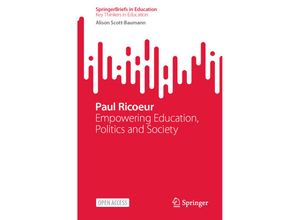This open access book employs Paul Ricoeur's methodologies to identify challenge and replace
with responsible language the many continuing abuses of power including in the university
curriculum and in the international discourse of right-wing populism. Using Ricoeur's
philosophy the book provides a meta-frame for current debates about the university and a
pragmatic micro-frame for supporting staff and students to develop important conversations on
campus. It introduces the Community of Inquiry approach and describes its use to engage with
complex ideas on which society has recently become silent. By contrasting Ricoeur's work on
Algeria and his work in Chicago USA .a bias blind spot is revealed in his desire for
dialectical balance and reciprocity. This prevented him (and for some years the author) from
accepting the connections between colonialism slavery and racism and the urgent need for
reparative justice. With Ricoeur the readers can think differently: howto recognize and tackle
racism and the democratic deficit how to reduce epistemic injustice by learning how to speak
out how to move away from forced polarities and develop a pedagogy of hope as well as an
acceptance of provisionality and the intractability of certain existential problems.

